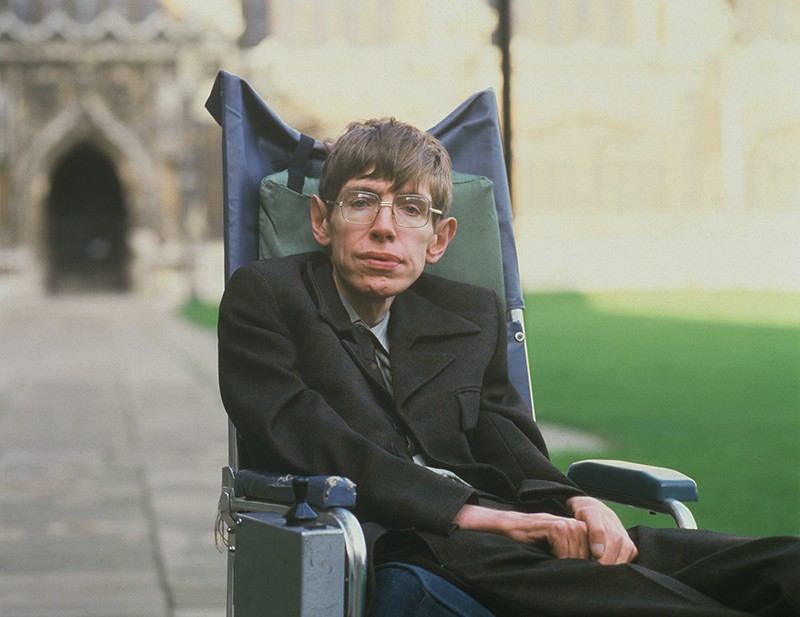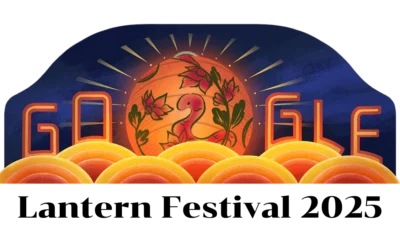Lifestyle
Interesting and Fun Facts about British Theoretical Physicist Stephen Hawking

Search engine giant Google celebrates the 80th birthday of Stephen Hawking, who was an English theoretical physicist, cosmologist, author, and Director of Research at the Centre for Theoretical Cosmology within the University of Cambridge, with a video Doodle on January 8, 2022. Here are some interesting and fun facts about Stephen Hawking.
Here is a look at the life and work of Stephen Hawking.
Personal
- Birth name: Stephen William Hawking
- Birthdate: 8 January 1942
- Birthplace: Oxford, England
- Died on: 14 March 2018 (aged 76)
- Death place: Cambridge, England
- Father name: Frank Hawking
- Mother name: Isobel Hawking
- Spouse(s): Elaine Manson (1995–2006), Jane Wilde (1965–1995)
- Sun sign: Capricorn
- Nationality: English
- Education:
- University of Oxford (BA)
- University of Cambridge (Ph.D.)
- Famous As: Theoretical Physicist – First To Set Out A Theory Of Cosmology
40 Interesting and Fun Facts about Stephen William Hawking
- Stephen William Hawking was born on January 8, 1942, in Oxford, England, to Frank and Isobel Hawking. His dad was a medical researcher. He belonged to a family of well-educated persons. His mom was one of the first female students to have graduated from Oxford University.
- Hawking was born when his family as well as the entire country was going through a financial crunch as a result of the ongoing World war II. He was the eldest of four children.
- His father became the head of the Division of Parasitology at the National Institute of Medical Research and went to Africa for research. He wanted him to become a doctor, however, Hawking appeared to be more interested in astronomy.
- He went to St. Albans School, however, he was never a brilliant student. He was more interested in what occurred outside the classroom and spent his time and energy designing new things.
- Afterward, against his dad’s desires, he wanted to seek after mathematics as his major yet as the subject was not taught at Oxford University at the time, he needed to take up physics and chemistry instead.
- He actually didn’t give an excessive amount of consideration to the bookish things and spent his time devising innovative techniques. In 1962, he graduated with honors and proceeded to go to the University of Cambridge for a Ph.D. in cosmology.
- During his first year, Hawking began to show abnormal physical symptoms; he would unexpectedly trip and fall, and his speech slurred. He at first suppressed these symptoms, yet when his father detected it, he was sent for a series of tests.
- It was diagnosed that he was in the early stages of Amyotrophic Lateral Sclerosis, which implied that the part of his nervous system liable for muscle control was closing down — a life-threatening condition.
- With this freshly discovered acknowledgment of the death of death and the fact that he had just two additional years to live, Hawking began focusing completely on his research work.
- Hawking became a member of the Institute of Astronomy in Cambridge in 1968 and the discoveries of cosmologist, Roger Penrose, on ‘Black Hole’ truly entranced him as he most definitely was working on the phenomena that were liable for the origin of the Universe.
- In 1970, Hawking found the ‘Second Law of Black Hole Dynamics.’ According to it the event horizon of a black hole can never get more modest. Alongside James M. Bardeen and Brandon Carter, he proposed the four laws of ‘Black Hole Mechanics.’
- Hawking visited Moscow in 1973 and his conversations with Yakov Borisovich Zel’dovich and Alexei Starobinsky assisted him to come up with ‘Hawking Radiation.’ The next year, he became a ‘Fellow of the Royal Society.’
- He is known for his work related to the study of black holes. With the theoretical prediction that black holes emit radiation, a theory called ‘Hawking radiation,’ he became the first to present a cosmology clarified by a union of the general theory of relativity and quantum mechanics.
- He began to get more acknowledgment for his research and discoveries through his print and TV interviews, and in 1975, he was awarded the Eddington Medal and the Pius XI Gold Medal, followed by the Dannie Heineman Prize and the Maxwell Prize.
- Hawking’s main focus of the research was in the field of theoretical cosmology, focusing on the development of the universe as administered by the laws of general relativity. His most significant work is accepted to be the study of ‘Black Holes.’
- For a significant part of his later life, he was totally paralyzed and communicated through a speech-generating device. Not succumbing to the despair of the disease, Hawking dedicated his entire life to his work and research.
- He met his first wife, Jane Wilde, a friend of his sister, shortly before the diagnosis of his illness. The couple got married in 1965. They had three children together: Robert, Lucy, and Timothy. Jane was a pillar of strength for Hawking at the start of their marriage, yet with his regressing physical condition and expanding global popularity, their marriage became a big burden on Jane and stress began to mix in their relationship.
- Hawking was then designated as a professor with a chair in gravitational physics in 1977 and got the ‘Albert Einstein Medal’ and an honorary doctorate from the University of Oxford.
- He progressively began losing control over his speech and it became expanding hard to comprehend him yet that this didn’t prevent him from getting delegated as the Lucasian Professor of Mathematics at Cambridge University in 1979.
- In late 1980, Hawking had a romantic affair with one of his nurses, Elaine Manson, and left Jane for her. He divorced Jane and married Manson in 1995. Their marriage proved to be detrimental to Hawking’s family life and he to a great extent avoided his children. It was thought that Elaine was mishandling him physically, yet Hawking denied it. He divorced Elaine Manson in 2006.
- In 1982, Hawking and Gary Gibbons organized a Nuffield Workshop on the topic ‘The Very Early Universe’ at Cambridge University, which focused essentially on the cosmological inflation theory.
- For his contribution to the study of the universe and his pioneering work in cosmology, he became a ‘Commander of the Order of the British Empire’ in 1982. He was subsequently honored with numerous lofty awards like ‘the Gold Medal of the Royal Astronomical Society,’ ‘the Paul Dirac Medal,’ and so forth.
- He published a model, the ‘Hartle-Hawking state’ with Jim Hartle, which stated that before the Big Bang, time didn’t exist and the concept of the start of the universe is meaningless.
- In 1985, he lost his voice after a tracheotomy. Subsequently, he required 24-hour care. His condition got the consideration of a Californian computer programmer, who invented a speaking program that could be coordinated by head or eye movement.
- Hawking acquired an international reputation for the first time in 1988 with the publication of ‘A Brief History of Time’. It was meant to be a simplified version of cosmology for the masses and became an instant bestseller.
- Hawking achieved commercial success with a few works of famous science in which he examined his theories and cosmology overall. His book A Brief History of Time showed up on the Sunday Times bestseller list for a record-breaking 237 weeks.
- In 1993, he co-edited a book on Euclidean quantum gravity with Gary Gibbons and published a collected edition of his own articles on black holes, and his series of lectures were published as ‘The Nature of Space and Time’.
- A renowned collection of essays, interviews, and talk named ‘Black Holes and Baby Universes and Other Essays’ was published in 1993. It was followed by a six-part TV series ‘Stephen Hawking’s Universe’ and a friend book.
- He wrote an easy to read a book on cosmology in 2001, ‘The Universe in Nutshell’, which was followed by, ‘A Briefer History of Time (2005), ‘God Created the Integers (2006)’, ‘God’s Secret Key to the Universe (2007)’, and so on.
- He showed up on TV during this period, in documentaries like—’The Real Stephen Hawking (2001)’, ‘Stephen Hawking: Profile (2002)’, ‘Hawking (2004)’, ‘Stephen Hawking, Master of the Universe (2008)’, and so on.
- In 2002, Hawking was ranked number 25 in the BBC’s poll of the 100 Greatest Britons.
- He took an interest in zero-gravity flight in a ‘Vomit Comet,’ courtesy of ‘Zero Gravity Corporation,’ and experienced weightlessness 8 times in 2007.
- Hawking retired as Lucasian Professor of Mathematics in 2009, inferable from University rules and guidelines. He kept on functioning as a director of research at the Department of Applied Mathematics and Theoretical Physics.
- Hawking’s physical condition progressively started to deteriorate. He could don’t really drive his wheelchair; he required a ventilator at times and was hospitalized a few times beginning around 2009. He was intently working with scientists on systems that could translate his brain patterns into switch activations.
- Other notable honors presented to Hawking incorporate ‘the Wolf Prize,’ ‘Companion of Honor by Her Highness,’ ‘Julius Edgar Lilienfeld Prize,’ ‘the Copley Medal,’ ‘the Presidential Medal of Freedom,’ ‘the Russian Fundamental Physics Prize,’ and so on.
- Stephen Hawking died peacefully at his home in Cambridge, England, on March 14, 2018, at 76 years old.
- To honor his contribution, several museums and buildings have been named after him. These are ‘Stephen W. Hawking Science Museum’ in San Salvador, El Salvador; the ‘Stephen Hawking Building’ in Cambridge, and the ‘Stephen Hawking Centre’ at the Perimeter Institute in Canada.
- His first wife, Jane, wrote a few books, including, ‘Travelling to Infinity’ and ‘My Life with Stephen.’
- He showed up on the renowned American sitcom, ‘Big Bang Theory.’
- On January 8, 2022, Google featured a video doodle on its homepage to celebrate Stephen Hawking’s 80th Birthday.
-

 Business2 weeks ago
Business2 weeks agoNayef Doleh Examines International Humanitarian Fundraising Strategies
-

 Business3 weeks ago
Business3 weeks agoHow Black Banx is Redefining Global Banking Strategies in 2025
-

 Business2 weeks ago
Business2 weeks agoHow to fill MSME Form 1? Step-by-Step Guide
-

 Tech4 weeks ago
Tech4 weeks agoHow to Switch Between Microsoft Teams and Skype, How To Export Messages, Files, and Contacts from Skype Before It Shutting Down
-

 Tech3 weeks ago
Tech3 weeks agoMicrosoft Teams to End SMS Messaging Feature Support for Android Phones and Switch to Phone Link App as Alternative
-

 Education3 weeks ago
Education3 weeks agoSchool Of Odd Thinkers – Think Odd, Learn a lot, and Earn a lot
-

 Education3 weeks ago
Education3 weeks agoThe Power of Differentiated Instruction: Patrick Granfar Discusses Its Impact on Student Learning
-

 Education3 weeks ago
Education3 weeks agoJeffrey Laino Offers a Close Look at Literary Analysis Implementation

























